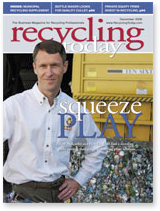Recycling Today, Dec, 2006 by Brian Taylor
 Americans consume a great deal of soda, juice and bottled water, and in the hot, sticky Southeastern United States soft drinks are especially in demand.
Americans consume a great deal of soda, juice and bottled water, and in the hot, sticky Southeastern United States soft drinks are especially in demand.
But even the thirsty residents of the U.S. Southeast have their limits, so not every beverage bottled or canned is consumed before its expiration date.
The leftover beverages present a business cost for bottling plants, which created an opportunity for Tony McCarthy and his company FMS Inc. of Clearwater, Fla.
FROM WATER TO PEPSI. Tony McCarthy learned the value of scrap commodities as a child growing up in Essex, England, where his father owned a trucking company.
On an adjacent property was a truck container fabricator, which often made containers with a combination of plywood, steel or aluminum as materials.
When it came time for those containers to be retired, young Tony’s grandfather showed him how to separate the metal, keeping a particular eye out for higher-value aluminum. “He took me to the scrap yard, and I got big-time money from that,” recalls Tony.
The lesson stuck with Tony even after he immigrated to the United States in 1982, just after graduating from high school. In the United States, Tony worked in sales positions throughout the 1980s and 1990s, including three years working as sales manager for an engineering company, combining two of his favorite career aspects into one job.
The entrepreneurial urge was always present, however, as was the recollection of how recovering salvaged and scrap materials can be a lucrative business effort.
Founding Florida Marine Surplus (FMS) in Clearwater in 2002, Tony initially focused on selling aftermarket marine surplus parts and supplies. Before the year was out, he also started The Drum Depot, which concentrated on selling clean, empty 55-gallon drums as components for floating docks.
Activity in the drum business soon began outpacing that on the FMS side, “which led to transitioning to strictly the recycling end of the business,” says Tony. The Drum Depot soon purchased two Nelmor-brand grinders made by AEC Inc., Schaumburg, Ill., so saleable secondary raw materials could also be produced from the stream of drums.
Working to expand the drum recycling business is what brought Tony into contact with bottling plants such as Tampa Pepsi, where drums of many different sizes–some full, some empty–were creating a disposal line item for the regional bottling plant.
At Tampa Pepsi, Tony helped set up a custom equipment line that required some upftont investment in processing capabilities, but ultimately is saving the company an estimated $10,000 per month in disposal costs.
GOOD TO THE LAST DROP. The processing, separation and recycling loop designed by Tony and FMS eliminates the landfill from the equation, finding a home for containers and expired product alike. At the Tampa Pepsi facility, two processing lines have been set up–one for beverages in aluminum cans, the other for those in PET (polyethylene terephthalate) plastic bottles.
On both lines, forklift trucks bring pallets of expired or off-spec product to a staging area where a metal hopper is loaded with product. The hopper is then raised and tipped into an elevated hopper that leads to a conveyor that feeds the processing line.
The product first passes into what McCarthy calls a “bottle busting” machine that is equipped with an augur and made by Sani-Tech Systems Inc., Duvall, Wash. At this step, most of the liquid is separated from its container and is directed into a retaining system beneath and then near the processing line. The solid scrap proceeds through an augur which empties the fluid even more.
On the plastics line, empty containers then head for the baling chamber of a downstroke baler made by International Baler Corp., Jacksonville, Fla. For the aluminum can line, FMS has recently installed a baler made by Harmony Enterprises Inc., Harmony, Minn. According to Tony, the line is now producing dense 1,000-pound bales that have improved shipping profitability.
During the compression process, yet more liquid is separated from the marketable aluminum or plastic scrap and joins the rest of the liquid in the retaining system.
The overall FMS system not only captures the aluminum and plastic scrap, but also retains the mixed liquids and stores them for eventual shipment to end markets that Tony has helped discover.
It turns out thirsty humans are not the only ones who enjoy soft drinks. Cattle ranchers have reported that the sugary mix has been very well received as a cattle feed additive.
“Cattle love it; they can drink a 6,000-gallon shipment in about two days,” says Tony. Donating the sweet byproduct to cattle ranches does not yield a sale price, but it does save on disposal and avoids any environmental hazards of too much sugar entering the water supply.
The cattle feed market is just one of several that FMS has discovered or helped cultivate. It turns out that bees are fond of excess cola syrup product, providing a nectar that can be purchased by honey producers for their beekeeping swarms.
